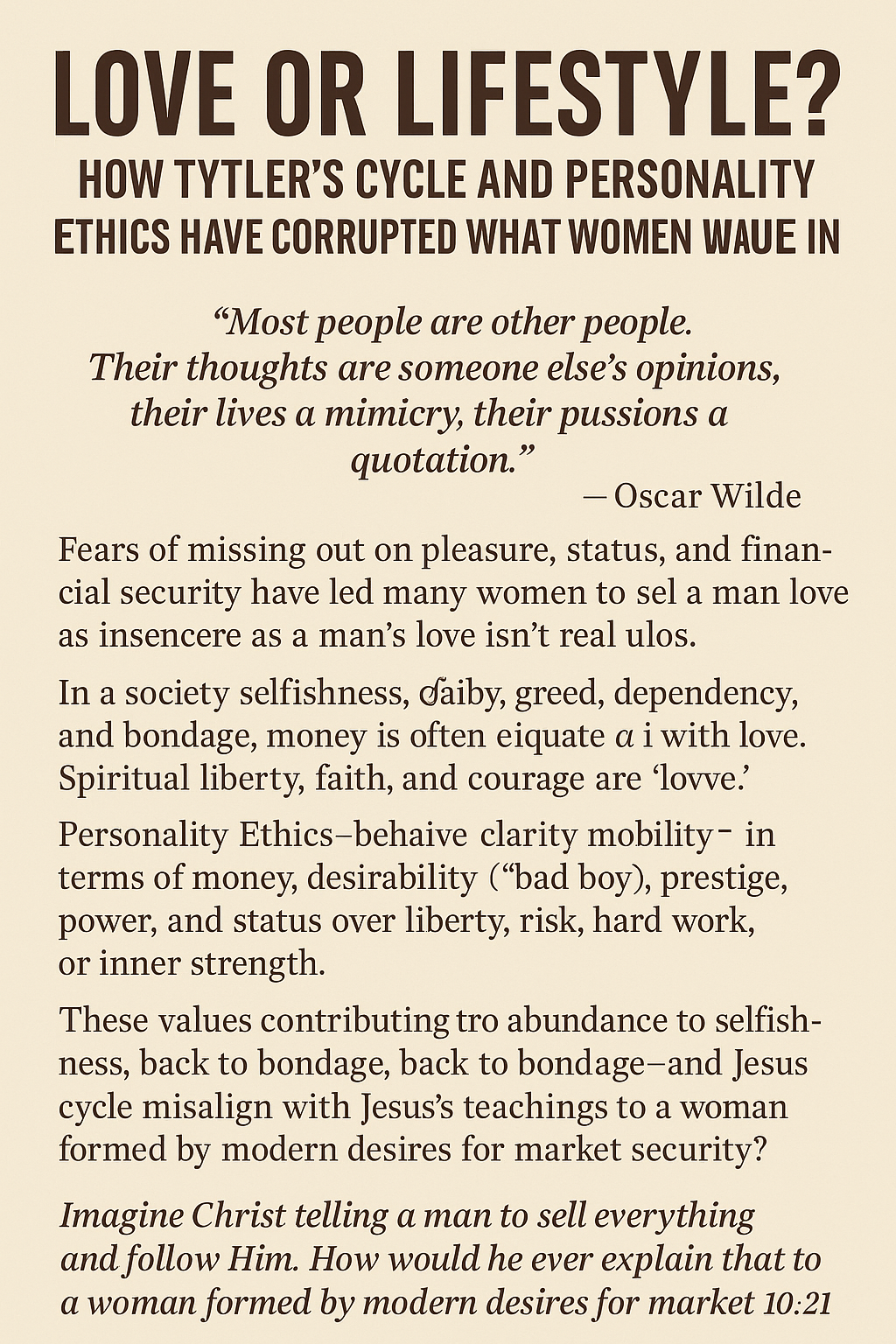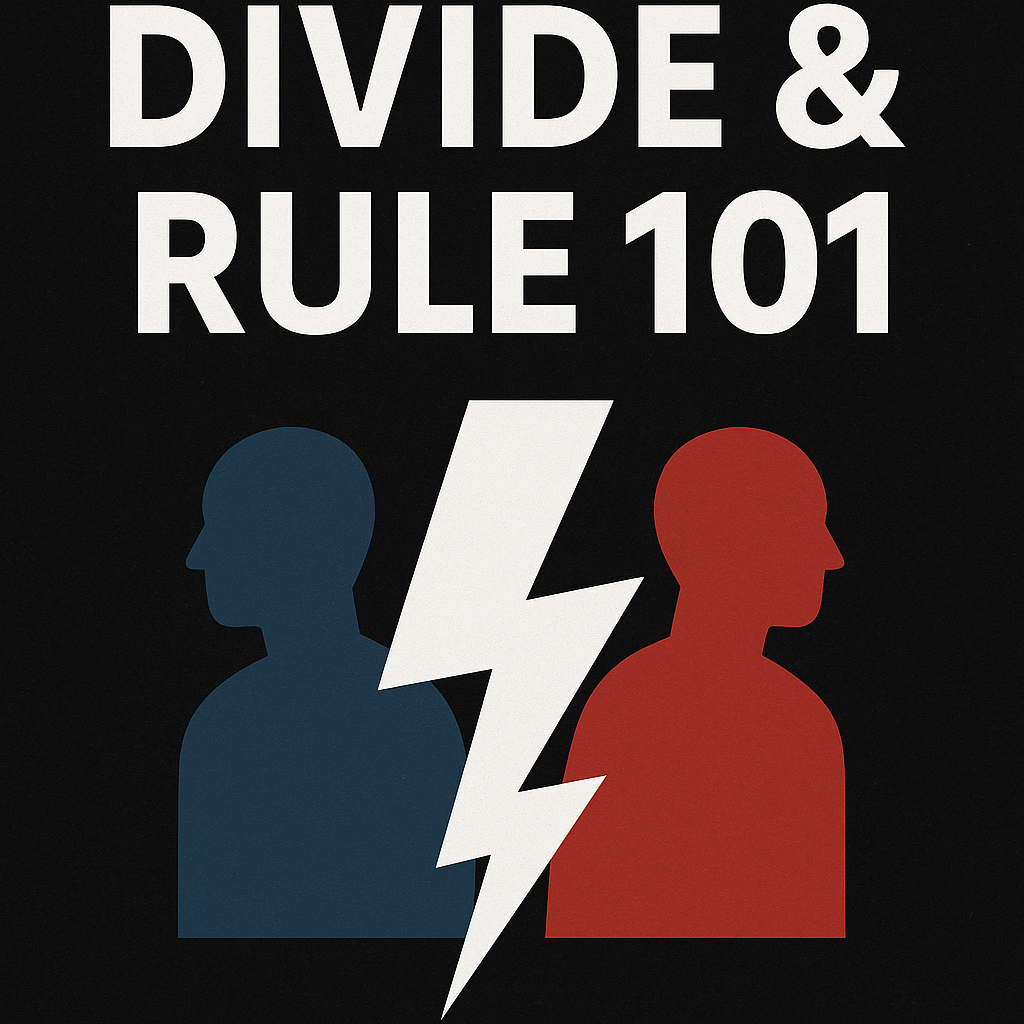Introduction: When Love is Measured in Luxury
In a world driven by consumption, comparison, and image, the very definition of love has been distorted. Many women—conditioned by culture, scarcity, and FOMO (Fear of Missing Out)—have come to associate a man’s love with his financial output, not his spiritual strength or moral courage. This is not universal, but it is widespread. And it fits precisely into the yellow decay of Tytler’s Cycle.
Love is no longer about covenant, character, and calling. It has been replaced by lifestyle, status, and social mimicry.
The Mimicry of Modern Desire
“Most people are other people…” — Oscar Wilde
In today’s world, what women are taught to want is not authentic. It’s a cultural script, reinforced by:
- Social media
- Celebrity relationships
- Influencer-driven lifestyle envy
- Peer pressure from other women
- Feminist and postmodern ideologies that equate value with financial independence or indulgence
Women have been taught to mimic values that are not rooted in faith, virtue, or truth but in fear, pride, and economic safety.
From Liberty to Bondage: How Tytler’s Cycle Plays Out
Tytler’s Cycle describes how societies collapse from liberty into bondage:
Faith → Courage → Liberty → Abundance → Selfishness → Complacency → Apathy → Dependence → Bondage
In the abundance/selfishness phase, people start to value:
- Pleasure over principle
- Status over service
- Wealth over wisdom
- Power over partnership
This mindset warps romantic expectations. The woman who once would have sought a man of courage, faith, and loyalty, now often seeks a man with a high income, aesthetic clout, and social leverage.
This is not love. It is transactional survival—bondage masked as empowerment.
Personality Ethics vs. Character Ethics
Stephen Covey contrasts Personality Ethics (appearance, charm, performance) with Character Ethics (integrity, humility, commitment).
Modern culture is obsessed with personality:
- Who can provide the best vacation?
- Who has the flashiest career?
- Who looks best on Instagram?
A man of character, courage, spiritual depth, and moral clarity may be dismissed as a “nice guy” or even weak.
The strong man, in today’s eyes, is not measured by his spiritual backbone but by his net worth and physical dominance.
Women raised in this culture often internalize that to desire less is to settle or to be behind.
The Feminine Fear of Lack
Many women are not gold-diggers. They are survivors of emotional neglect, fatherlessness, and societal messaging that equates provision with love:
- If he loves you, he pays.
- If he sacrifices emotionally, it doesn’t count unless it has a dollar sign.
- Security is love. Struggle is abuse.
This is how fear of poverty and scarcity becomes a lens that filters out good men and exalts emotionally vacant ones with money.
Imagine Christ Saying, “Sell All That You Have”
“Sell everything you have and give to the poor, and you will have treasure in heaven. Then come, follow me.” — Luke 18:22
Imagine Christ giving this command to a modern man today:
- How would his wife respond?
- How would his girlfriend or fiancée react?
In an age where a man’s value is often tied to his earning power, investments, and financial upward mobility, this invitation would not only be spiritually radical—it would likely be relationally devastating.
Today’s woman, shaped by a culture of lifestyle worship, may feel abandoned, betrayed, or fearful if her partner followed Christ to the point of financial surrender. This reveals the modern dissonance between:
- True discipleship and
- Lifestyle Christianity
The man who chooses eternal treasure over temporal gain is often seen not as noble, but as naive.
We must ask: would Mary have discouraged Joseph from obeying the call of God to flee into Egypt if it meant temporary poverty? Would Ruth have chosen Boaz if she had demanded gold before grace?
The answer reveals the hearts of women shaped by spiritual faith versus those shaped by worldly fear.
Frame of Reference Integration
| Framework Element | Connection to the Problem |
|---|---|
| Tytler’s Cycle | Women mirror the values of abundance → selfishness → dependence |
| Personality Ethics | Appearances replace character in mate selection |
| Frame of Reference | Social media and peer culture distort real love |
| Emotional Intelligence | Fear and insecurity override wisdom and faith |
| Transitional Characters | Needed to break cycles of value confusion |
| Spiritual vs. Worldly Path | Choosing luxury over godliness accelerates societal collapse |
Redemption: Raising the Standard Again
We must re-teach our daughters:
- That spiritual leadership is greater than financial provision.
- That love rooted in covenant will outlast one rooted in credit scores.
- That the man who loves liberty, faith, and truth may not own a yacht, but he is rich in what matters.
We must call men to become strong again—not in the shallow sense of domination or wealth, but in the eternal sense of righteous masculinity, emotional leadership, and covenant keeping.
And we must remind women:
To stop trading queenship for comfort.
To stop confusing provision with passion.
To see through the mimicry and choose truth.
Final Word: What We Desire Reflects What We Worship
In the end, love is not about lifestyle. It is about shared vision, mutual sacrifice, and spiritual alignment.
A man is not validated by his money.
A woman is not validated by his ability to fund her lifestyle.
Both are validated by their willingness to walk in truth, courage, and eternal purpose.
If we get the definition of love wrong, we lose everything else downstream.
It’s time to raise the frame of reference—and with it, our expectations.







